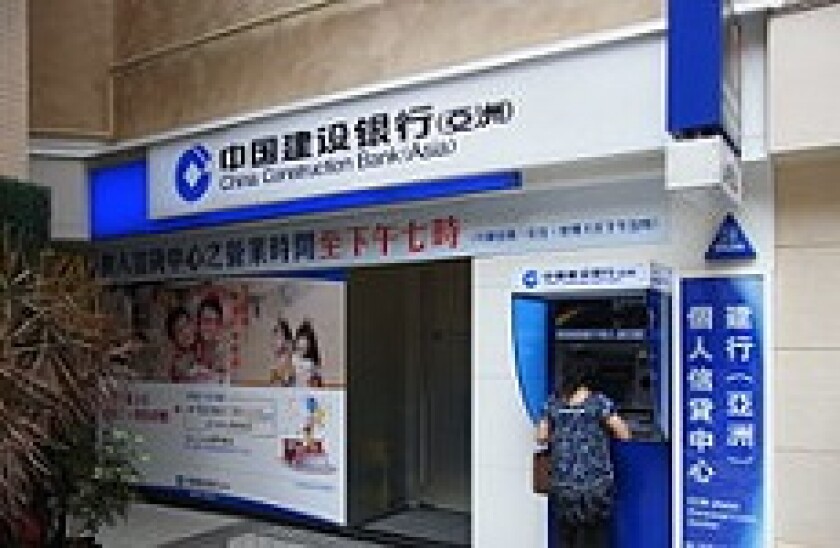The deal was priced on Tuesday, breaking an eight-year drought in equity-linked H-share issuance. It was exchangeable into shares of Hong Kong-listed China Construction Bank Corp, and the issuer was a unit of A3/ A-/A- rated Baosteel Group Corp, the state-owned steel producer.
But beyond the novelty of the trade, there was plenty of action behind the scenes. The issuer had appointed HSBC and UBS to work on documentation. Then, a couple of hours before launching the deal, it invited banks — including HSBC and UBS — to pitch for a spot.
This style of mandating banks is a common feature in accelerated bookbuilds, or blocks, for straight equity deals, but less so in the equity-linked universe, bankers said. Convertible bond transactions are typically mandated well ahead of execution.
HSBC and UBS eventually took pole position on the deal, winning the titles of joint global co-ordinators, joint lead managers and joint bookunners. The pitch attracted strong participation from many banks, and the syndicate was quickly put together on Tuesday evening.
Barclays, BoC International, CCB International, China Merchants Securities (HK), Citi, CMB International and Morgan Stanley joined as JLMs and JBRs. At launch however, only the two leads were listed as bookrunners on the term sheet.
A banker working on the deal said he was not a fan of the bidding process because some banks were flying blind and put in bids without a full understanding of how to price the deal.
“It became a bit of a price war as there were banks that bid at levels that would’ve failed to clear the market, which was why the terms were so punchy,” he said. “Some decided on their price by sticking one finger up in the air. Maybe it encourages transparency, but at what cost?”
But another equity-linked banker on the deal disagreed, saying the process enabled genuine price discovery and helped keep all the banks honest. It was also a good way for the issuer to extract the best pricing, he added.
Not for all
A banker away from the Baosteel exchangeable said it would not be a widely used strategy. The last company he remembered deploying such an approach for its convertible was Taiwanese firm Hon Hai Precision Industry Co in 2010.
“For one, the issuer needs to be very well known and also investment grade,” he said. “There must be no doubt about the pricing, there must be plenty of borrow in the market, and it has to have an equity story that is so strong it doesn’t need any explaining.
“A lesser issuer would not be able to call up banks at such short notice and force them to do a deal without any feedback from investors,” he added. “The only reason Baosteel could’ve done it was because it got banks to work on documentation early on and was a strong name.”
Furthermore, H-share CB issuers now need to register with the National Development and Reform Commission (NDRC) before executing a trade, which means a longer lead time is required. Baosteel is understood to have registered with the NDRC in advance for its exchangeable, said a banker on the deal.
Paying up
Baosteel opened books for the three year bullet at 5.30pm local time on Tuesday with a zero coupon and an exchange premium range of 38.5%-45.0% over the reference share price of HK$5.48. The initial exchange price was HK$7.59-HK$7.95.
There was plenty of pent-up demand as investors were desperate for new paper after a lack of large deals this year, said bankers. But the real question was how much investors were willing to pay. The bond was rich even at the low end, and the issuer left little on the table for investors.
“With a high premium and no coupon, the issuer got to have its cake and eat it too,” said the second banker close to the deal.
The leads used a credit spread assumption of 180bp and a bond floor of 99.3. No stock borrow was provided as it was readily available in the market. Implied volatility came in at 30.3 versus a historic volatility of 28, making it an expensive deal. The trade was priced at the lower end of its exchange premium at 38.5%.
Unusually for an equity-linked deal, the offering featured a keepwell and liquidity support deed provided by Baosteel Group. Although keepwells are common on straight bonds, they are a rarity in the Asian equity-linked market. But this was not the first time it has been used, bankers say.
Baosteel had a keepwell because it was comfortable with the structure from its straight bond issuance. But while traders in Asia were familiar with the keepwell, European investors were not, which meant additional investor education was required.
Hedge fund trade
Books closed before 10pm and were oversubscribed. The response was positive despite some nervousness in the market about the shooting down of a Russian jet a day earlier. Baosteel is an investment grade name and the underlying stock provided rare exposure to a FIG credit in Hong Kong-listed CCB.
In allocation, the top 10 investors bagged 50% of the deal, as the leads wanted to keep the bonds in the right hands. There were more than 40 lines in the book, with around 55% going to European accounts and 45% to Asia.
“Allocations were skewed to hedge funds, because this was a good hedge fund trade with a very liquid underlying and availability of stock borrow,” the banker said. “It also opens the equity-linked market for H-shares as it is the first deal to close successfully since the NDRC’s rule change.”
This was the second largest equity-linked bond by size this year after United Microelectronics Corp priced a $600m convertible in May, and has the seventh largest conversion premium on record in Asia ex-Japan ex-onshore China, according to Dealogic.
Baosteel's exchangeable traded down to 99.7-99.8 in the aftermarket, while shares in CCB were down 0.4% on Wednesday afternoon before rebounding on Thursday.

